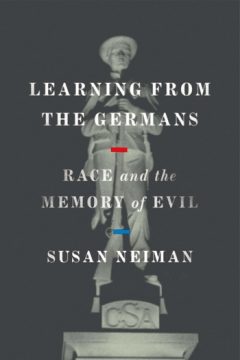Eric Banks at Bookforum:
 Neiman’s book comprises two parts. The first is dedicated to the historical underpinnings of the German reckoning with Nazism and the Holocaust beginning in the early ’60s, with television broadcasts of the Eichmann and Frankfurt Auschwitz trials, which led a younger generation to ask, for seemingly the first time, about the complacency and complicity of teachers, politicians, and above all fathers. (“Being German in my generation,” the author Carolin Emcke, born in 1967, tells Neiman, “means distrusting yourself.”) Learning from the Germans narrates the subsequent political and cultural evolution, including Willy Brandt’s 1970 Kniefall in penance to the victims of the Warsaw Ghetto Uprising, the Historians Debate of the 1980s, and the 2003–2005 construction of Peter Eisenman’s Holocaust Memorial, a site Neiman dislikes for the vagueness of its abstract form but whose gestation was admittedly long and difficult. Reunification posed a particular set of challenges to how Nazism and the Holocaust were publicly remembered; she contrasts the record of the former East Germany with that of West Germany and largely defends the avowed antifascist state from the charge that it failed to address the German past with anything comparable to Western efforts. Three decades after reunification, the extremist AfD party explicitly frames what it calls a “guilt cult” and threatens the success of the postwar project. Yet no other country (at least in Europe or North America) has made anything like the strides Germany has toward facing the legacy of national evils, whether colonialism in Britain and France or slavery and Jim Crow in America. Only in 2009 did the US Senate approve a resolution apologizing to black Americans for slavery.
Neiman’s book comprises two parts. The first is dedicated to the historical underpinnings of the German reckoning with Nazism and the Holocaust beginning in the early ’60s, with television broadcasts of the Eichmann and Frankfurt Auschwitz trials, which led a younger generation to ask, for seemingly the first time, about the complacency and complicity of teachers, politicians, and above all fathers. (“Being German in my generation,” the author Carolin Emcke, born in 1967, tells Neiman, “means distrusting yourself.”) Learning from the Germans narrates the subsequent political and cultural evolution, including Willy Brandt’s 1970 Kniefall in penance to the victims of the Warsaw Ghetto Uprising, the Historians Debate of the 1980s, and the 2003–2005 construction of Peter Eisenman’s Holocaust Memorial, a site Neiman dislikes for the vagueness of its abstract form but whose gestation was admittedly long and difficult. Reunification posed a particular set of challenges to how Nazism and the Holocaust were publicly remembered; she contrasts the record of the former East Germany with that of West Germany and largely defends the avowed antifascist state from the charge that it failed to address the German past with anything comparable to Western efforts. Three decades after reunification, the extremist AfD party explicitly frames what it calls a “guilt cult” and threatens the success of the postwar project. Yet no other country (at least in Europe or North America) has made anything like the strides Germany has toward facing the legacy of national evils, whether colonialism in Britain and France or slavery and Jim Crow in America. Only in 2009 did the US Senate approve a resolution apologizing to black Americans for slavery.
more here.
